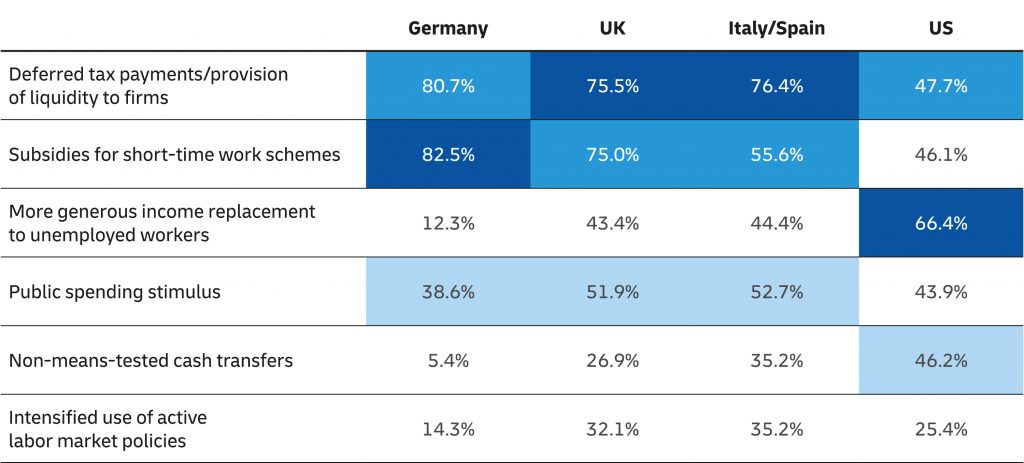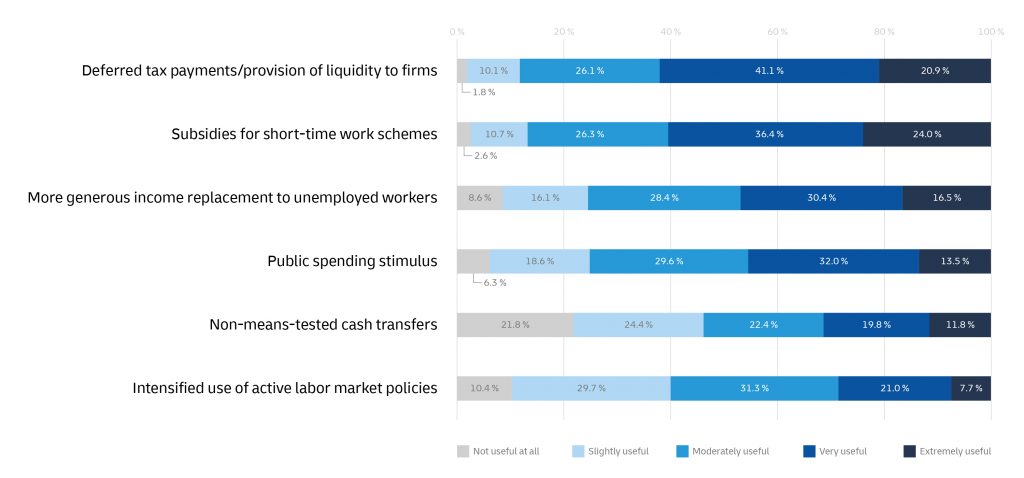Two-thirds (66.4%) of U.S. labor economists surveyed as part of the “IZA Expert Panel” regard more generous income replacement to unemployed workers as “very useful” or “extremely useful” to mitigate the negative labor market consequences in the current phase of the COVID-19 pandemic. Almost half (46.2%) of respondents consider non-means-tested cash transfers, such as “helicopter money,” very useful.
This is in stark contrast to respondents from European countries, who on average attribute the greatest usefulness to policy measures aimed at preventing unemployment, e.g. by providing liquidity to firms and subsidizing short-time work. Less than half of U.S. respondents find these measures particularly useful in their country. This striking difference can be attributed to the fact that firing costs are much lower and the social safety net is much weaker in the U.S. than in most European countries. As a consequence, U.S. unemployment had already skyrocketed at the time of the survey.
As Table 1 shows, the largest differences can be seen between the U.S. and Germany. The top two measures in the U.S. receive the least support among German experts – with more generous unemployment assistance and non-means-tested cash transfers considered very useful by only 12.3% and 5.4% of respondents, respectively. In Germany, where short-time work has been particularly successful at safeguarding employment in previous crises, this policy receives the strongest support, also among European countries.
Table 1: Country differences in expert opinions on COVID-19 policy responses

Source: IZA Expert Panel 2020. Notes: Number of observations: 57 (Germany), 53 (UK), 55 (Italy/Spain), 132 (US). Percentages are the share of respondents who consider the respective policy response as “very useful” or “extremely useful”. Colored fields show the top-3 policies considered most useful in the respective country context.
Across all respondents worldwide, deferred tax payments and other forms of liquidity support to firms were most often seen as “extremely useful” or “very useful” (62.0%), followed by short-time work (60.4%). The experts’ focus is clearly on acute crisis relief measures at this point, while an intensified use of active labor market policies (28.7%) may become more important in the recovery period. Among all measures, non-means-tested cash transfers were most often found “not useful at all” (see Figure 1).
Figure 1: Global expert opinions on COVID-19 labor market policy responses
Source: IZA Expert Panel 2020. Notes: The number of observations ranges between 492 (Intensified use of active labor market policies) and 513 (Deferred tax payments/provision of liquidity to firms). Exact wording of the question: “In view of the expected negative impact of the COVID-19 pandemic on the economy, many governments have implemented a range of aid measures to support firms and workers. What do you think, how useful are the following policies, if applied in your country, with regard to mitigating negative labor market consequences of the pandemic?” The respondents were asked to answer this question regardless of whether their country had adopted such a policy.
About the IZA Expert Panel
The panel measures the opinions, beliefs and attitudes of IZA network members about the impact of the COVID-19 pandemic on labor market outcomes in their respective countries. More than 500 labor market economists from 50 countries participated in the first survey wave, conducted in mid-May 2020. Further results will be published shortly.

